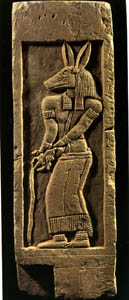Doorjamb (showing Anubis). Sandstone. From Meroe. Excavations
of the University of Pisa. Khartoum, National Museum. Source:
Wildung, Dietrich. Sudan: Ancient Kingdoms of the Nile.

|
|
God of mummification.
The Kushites believed that Anubis attended the funerary ceremonies
of the deceased. Anubis was believed to give life to the spirit
of dead. This god also had another important task, which was
to weight the heart of the dead against Ma'at (the concept
of righteousness and justice). If the heart was heavier than
Ma'at, Anibus prevented the dead person from entering the afterlife.
If the heart was lighter than Ma'at, Anibus would allow the
person to enter.
Paintings of this god are present on the walls of, almost,
every funerary chamber in Sudan. It is most likely that the
Cult of Anubis had originated in Sudan. Egyptian literature
commonly associate his cult with Kush. A poetic pyramid text
from Egypt reads as follows:
"The jackal awakes, the moon arises,
The sleepers
awake, the men of Nubia [Kush] awake,
For the great bittern which
came from the Nile,
For Anubis, who came from the tamarisk
grove;
Pure is the mouth of the king…"1
|